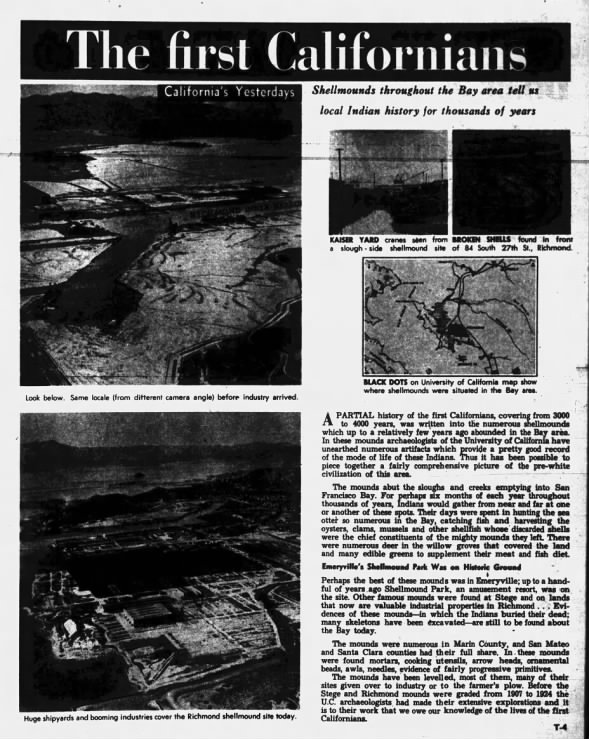This article's photos did not survive the transition to print, then digital archiving, then this blog very well. I've left two out, that are basically unusable, see newspaper clipping at bottom of this post. More about shellmounds here.
The first Californians
Shellmounds throughout the Bay area tell us local Indian history for thousands of years

|
| Look below. Same locale (from different camera angle) before industry arrived. |

|
| Huge shipyards and booming industries cover the Richmond shellmound site today. |
A PARTIAL history of the first Californians, covering from 3000 to 4000
years, was written into the numerous
shellmounds
which up to a relatively few years ago abounded in the Bay area. In these
mounds archaeologists of the University of California have unearthed
numerous artifacts which provide a pretty good record of the mode of life of
these Indians. Thus it has been possible to piece together a fairly
comprehensive picture of the pre-white civilization of this area.

|
| BLACK DOTS on University of California map show where shellmounds were situated in the Bay area. |
The mounds abut the sloughs and creeks emptying into San Francisco Bay. For
perhaps six months of each year throughout thousands of years, Indians would
gather from near and far at one or another of these spots. Their days were
spent in hunting the sea otter so numerous in the Bay, catching fish and
harvesting the oysters, clams, mussels and other shellfish whose discarded
shells were the chief constituents of the mighty mounds they left. There
were numerous deer in the willow groves that covered the land and many
edible greens to supplement their meat and fish diet.
Emeryville's Shellmound Park Was on Historic Ground
Perhaps the best of these mounds was in
Emeryville; up to a handful of years ago
Shellmound Park, an amusement resort, was on the site. Other famous mounds were found at
Stege and on
lands that now are valuable industrial properties in Richmond ... Evidences
of these mounds - in which the Indians buried their dead; many skeletons
have been excavated - are still to be found about the Bay today.
The mounds were numerous in Marin County, and San Mateo and Santa Clara
counties had their full share. In these mounds were found mortars, cooking
utensils, arrow heads, ornamental beads, awls, needles, evidence of fairly
progressive primitives.
The mounds have been levelled, most of them, many of their sites given over
to industry or to the farmer's plow. Before the Stege and Richmond mounds
were graded from 1907 to 1924 the U. C. archaeologists had made their
extensive explorations and it is to their work that we owe our knowledge of
the lives of the first Californians.
Here are some maps of the area in the photos above, I believe. You can drag
the slider to see how they relate to the modern map,
here.



Comments
Post a Comment